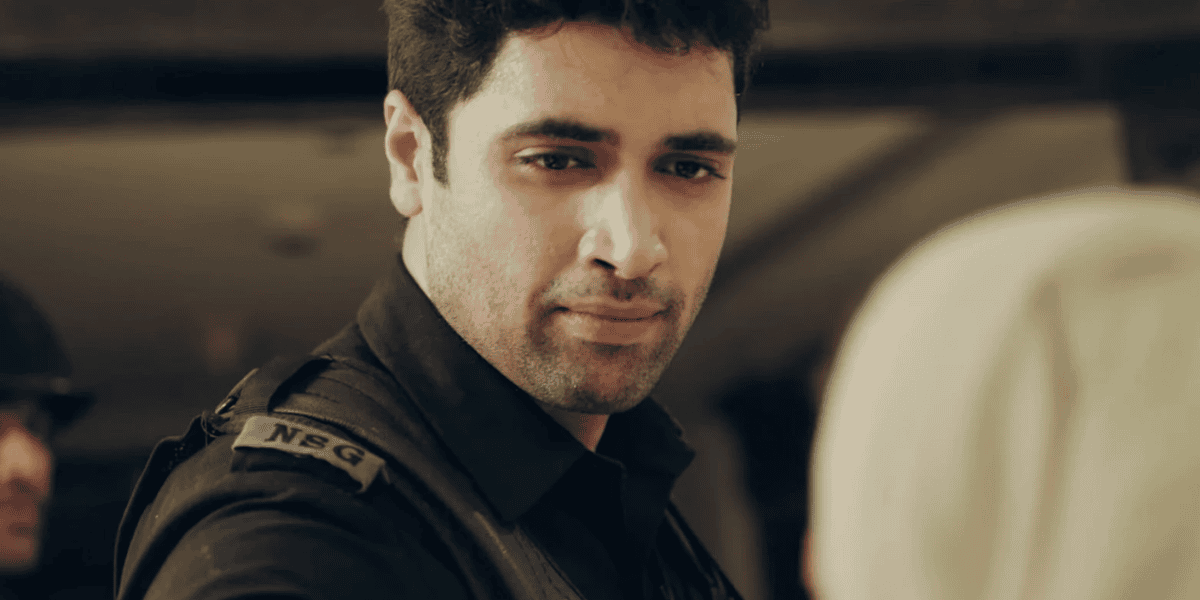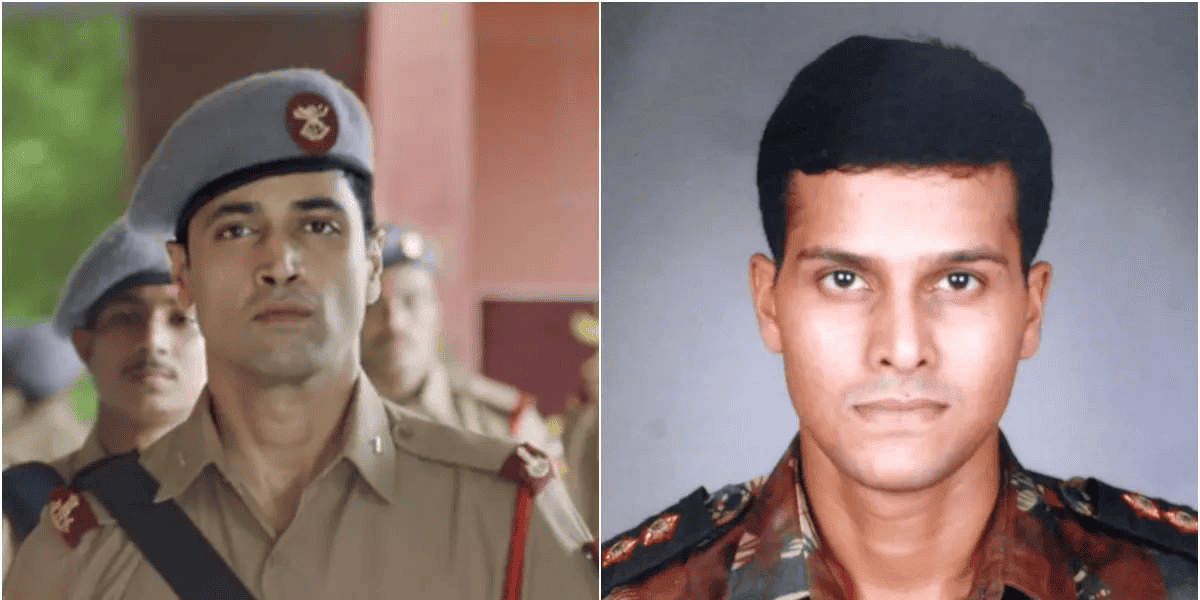Sandeep Unnikrishnan on Major Film: However, the Biopic by Sandeep Unnikrishnan Is Emotional but Lacking in Nuance!
We may be overlooking the fact that heroes aren’t characterised solely by their heroic deeds; they are, in fact, human beings. Major, despite being effective in portions, has the same problem.
Major’s Sandeep Unnikrishnan, played by Telugu star Adivi Sesh, believes that soldiers are allowed to experience terror when they are attacked, which is a realistic viewpoint. He asks one of the trainees about how he handled the situation during the scenario, which is conducted by Sandeep, an NSG trainer.
A soldier’s anxiety is natural when he witnesses the deaths of his fellow soldiers while under attack, and he tells the latter as much. However, as soldiers, they are obligated to continue in the face of their fears. Even though heroes and martyrs are often depicted in unrealistically large-than-life depictions of their bravery, it’s pleasant to see the difference between courage and fearlessness gently demonstrated here.
It’s a biopic about Major Sandeep Unnikrishnan, a 26/11 martyr, by Sashi Kiran Tikka, that gets certain things right. It’s a refreshing change of pace from the recent trend of overblown patriotism and jingoism. As a result, the picture isn’t free of the formulaic filmmaking around nationalist narratives that has become increasingly prevalent.
An altruistic hero with a preference for moral high ground is usually the protagonist in this type of story. Either he doesn’t make any mistakes at all or his blunders have a purpose. Everyone’s light dims because of his sacrifice. And he is a man, frequently displaying superhuman power against soaring music.
From his beginnings in Kerala through his adolescent years in Bangalore, Sandeep’s early life is shown by Major. Sandeep, played by Adivi, has always wanted to be a police officer, and he’s shown a strong desire to help others since he was a child. He’s also shown a tenderness for his schoolmate, Isha, played by Saiee Manjarekar, who he falls in love with at a young age, but their romance isn’t convincing.

The first section of the film focuses on this. Sandeep, however, is nearly too simple, too homogeneous, and full of cliché monologues about how Sandeep was never theirs (his parents’) but rather the nation’s.
Many media interviews capture considerably more lovable and colourful characteristics of the real-life Sandeep – the fact that he enjoyed adventure, had a great understanding of history and architecture, and most importantly, the fact that loved life and “never wanted to die,” as his mother puts it. None of this, or his personal interactions outside of the workplace with his other cops, are fully explored in the movie.
When the story gets to the heart of the matter—the Mumbai terror strikes on 26/11—it really takes off. At the Leopold Café and the Taj Hotel, gunfire erupts, and terrorists kidnap hostages and take them into their custody.
For the most part, it’s a faithful depiction of the actual events, including details like how terrorists got into town and how they carried out their terror acts. At a time when the depiction of terrorists in the media – whether actual or fictional – is overblown to propagate Islamophobia, it is commendable that Major does not overdo it with jingoism.
Minority Report doesn’t over-exaggerate terrorists like Ajmal Kasab and Headley as skull-cap-wearing Muslims who cry out “Allah” to emphasise their religion every so frequently. We can’t help but root for Major Sandeep because they’re just being themselves.
The scenes in which the Major leads the NSG Commandos are riveting and convincing, despite the presence of some expected cheesy rhetoric about what it means to be a soldier and Sandeep’s desire to save everyone from each other’s clutches. The film, on the other hand, rarely mentions any of the other 26/11 heroes. Tukaram Omble is only mentioned in passing in a news report on the capture of Kasab by his team, the Assistant Sub-Inspector.
But Hemant Karkare, Mumbai’s Anti-Terrorism Squad Chief, and Ashok Kamte, Mumbai’s Additional Police Commissioner, are not. Except for hotel manager Rodriguez, who provides intelligence to the NSG commandos team, we see little little about how many hotel staff members endangered their lives to ensure the safety of others besieged within the building.
Real-life Major Sandeep saved the life of Commando Sunil Kumar Yadav after he was wounded in shooting at the Taj by a character named Aakash, one of the commandos in the film Sandeep is shown training. Criticizing the film’s supporting cast, this shows that they are only there to serve as punchlines for the hero’s jokes. One of the hotel guests, Sobhita Dhulipala, has a storyline that culminates in Sandeep making the ultimate sacrifice in order to save her and their child.
When there was so much inspiration to take from the real-life people who were affected by 26/11, well-developed supporting characters (beyond Sandeep’s family), even in tiny roles, may have brought more depth to an otherwise solid endeavour
Sandeep’s connection with Isha is the one (kind of) exception to this rule, and the grief she expresses when she can’t have him by her side when she does.
The two engage in a heartfelt conversation in which she laments the fact that the sacrifices made by soldiers are the ones that are remembered, rather than the ones made by civilians who ensure that soldiers can continue on their mission. When the narrator mentions how only soldiers can truly understand what they’re doing, it’s an oversimplification and negation of what might have been a more powerful and realistic exchange for the viewer.
As a result of Isha’s ultimate decision to file for divorce — a portion of Major’s life that is almost completely hidden from view – the film is able to take more creative liberties in order to represent reel Sandeep’s sacrifice as larger than it could have been.
Many aspects of Sandeep’s character are well-represented in the film, especially when compared to the existing literature, such as his love of animals, his desire to put duty before self, and his parents’ reactions when they learn about Operation Black Tornado, Sandeep’s involvement in it, and his eventual demise. A clichéd but effective climax has Major Sandeep’s supposed last words, “Do not come up, I will handle them.”

The movie starts off slowly, but once it gets going, the writing manages to keep you interested despite its problems. A parent who does not want his kid to join the military but is concerned about him yet, Prakash Raj excels in this role. It may be because of the cliche and restricting settings, yet the performance of Saiee and Adivi grows on you as the film progresses. Adivi’s Sandeep is the focus of the score, which isn’t particularly noteworthy or memorable but does have some classic swelling crescendos.
Sincerely, Major is a heartfelt attempt to tell the story of Major Sandeep (K Unnikrishnan), who was killed on 26/11, but it could have used more colour and complexity given the abundance of documented material on the day and the filmmakers’ access to his parents.
Perhaps the issue is the way we view heroes – we talk about their bravery so much that we forget that they were also multi-dimensional, fallible, genuine individuals. We need to rethink how we view heroes. The hero would have appeared no less patriotic or brave if we had shown more of Sandeep’s life onscreen, but rather he would have appeared more human.
Read More: Jamie Lissow Divorce: How Long Did Jamie and Jessica Spend Apart Before They Got Divorced?



Comments are closed.